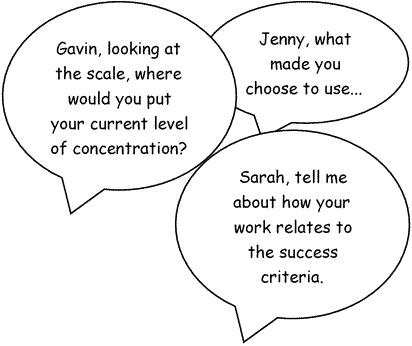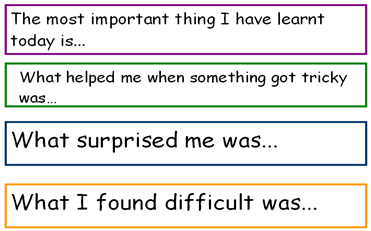Developing metacognition in your school
The power of reflection
Pupils are able to reflect on their learning with various degrees of sophistication, not necessarily age related. Some older pupils find it almost impossible to be reflective (as do some adults), whilst others will be highly reflective. Teachers need to scaffold, model and support the development of reflection. It is not sufficient simply to provide the opportunity to be reflective, although this is a good starting point!
For example, when asking reflective questions, such as ‘What was the most difficult part of the lesson?’ some pupils will simply respond, ‘All of it’. This simplistic type of response is unlikely to lead to any change. With the aid of examples, sentence starters, more specific questions and prompting by the teacher, these pupils can go beyond the simplistic and start to give more detailed, more specific and more sophisticated and discerning answers. For example, they start to identify specific parts of questions they had difficulty with or can describe part of the activity they had trouble understanding. If you don’t regularly use reflection activities in your classroom, be prepared for some pupils to find it difficult. You will have to persevere! If you want reflection time to have impact it needs to be well planned and you need to push pupils to be analytical.
Metacognitive reflection includes not only an evaluation of the quality of work produced, but also the approach they have taken. It needs to focus on them as learners. Pupils need to understand that learners can increase their effectiveness and efficiency; that learning in itself is a skill set that they can develop. Being reflective is a way to examine and eventually enhance their learning prowess as well as being able to achieve higher quality end products.
An example below looks at how reflection can move pupils along a journey to consider not just the quality of their work, but also their approach and what it means to them as a learner.
Evaluating the product of my learning |
Considering my learning approach |
Thinking about me as a learner |
To what extent I have met the success criteria? |
Did I understand the criteria? Did I ask any questions that helped me to have a better understanding of the success criteria? |
Why is success criteria and mark schemes important to learners? |
EVENT/ACTIVITY - e.g. What happened? What was the sequence of events? What role did I play? What tasks did I perform?
REFLECTION/ANALYSIS - What have I learnt from this experience/activity? What issues or questions did it raise for me?
UNDERPINNING KNOWLEDGE AND UNDERSTANDING - What knowledge/theory helps me to understand this event/activity? How does the learning link to other subjects or previous learning? What will it help me with in the future?
ISSUES FOR FUTURE DEVELOPMENT AND LEARNING - What else do I need to know to increase my understanding? How can my knowledge /practice be improved? Are there any unresolved issues, e.g. what I am still unsure of?
Other examples of questions that help to consider the three aspects of the reflection
Evaluating the product of my learning |
Considering my learning approach |
Thinking about me as a learner |
Today I have learnt.. |
What did you do first? How did you break the task down into chunks? |
I feel happy about... |


When? Where? How long? With whom? Why?
It is important to give pupils the opportunity to reflect at different points along their learning journey. Sometimes reflection may be at the end of a unit of work, at the end of a task or at the end of a lesson. Reflection time may also be carried out mid-point in a lesson or at the start of a lesson, for example to consider how yesterday's lesson can be used to help them make better progress in today's lesson.
The length of time for reflection may vary depending on what is being evaluated and the depth of the evaluation being sought. Ensure you give sufficient thinking time, not just time for answering the question or prompt.
Reflection can be one-to-one at any point during a lesson through careful questioning and prompting by the teacher.
Reflection can be an individual, a group activity or a whole class exercise. It is important to think creatively about how reflection skills can be developed and for the class teacher to make professional judgements about how reflection can aid learning in their subject.
Links
![]()
Like to share?
Why not send us your resources.